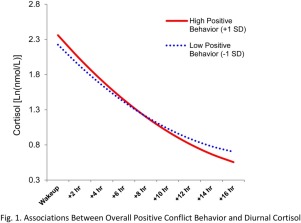当前位置:
X-MOL 学术
›
Psychoneuroendocrinology
›
论文详情
Our official English website, www.x-mol.net, welcomes your
feedback! (Note: you will need to create a separate account there.)
Couples’ Behavior During Conflict in the Lab and Diurnal Cortisol Patterns in Daily Life
Psychoneuroendocrinology ( IF 3.4 ) Pub Date : 2020-05-01 , DOI: 10.1016/j.psyneuen.2020.104633 Sabrina J Bierstetel 1 , Richard B Slatcher 2
Psychoneuroendocrinology ( IF 3.4 ) Pub Date : 2020-05-01 , DOI: 10.1016/j.psyneuen.2020.104633 Sabrina J Bierstetel 1 , Richard B Slatcher 2
Affiliation

|
The current study tested whether positive and negative behaviors exhibited by couples during conflict interactions assessed in the laboratory are associated with individuals' diurnal cortisol patterns (i.e., circadian rhythms in cortisol across the course of the day) outside of the lab. Participants (N = 82) provided a total of 18 salivary cortisol samples over a 3-day period and came into the lab with their spouse to engage in two ten-minute dyadic conflict discussions. These videotaped interactions were coded to assess the intensity with which couples displayed various positive behaviors (e.g., humor, affection) and negative behaviors (e.g., defensiveness, frustration) during the conflict discussions. Multi-level modeling was used to examine the associations between couples' positive and negative behavior during conflict discussions and diurnal cortisol patterns in daily life. Results showed links between overall positive, but not negative, behaviors and diurnal cortisol patterns. Individuals who experienced more positive behaviors with their partner during the conflict discussion showed a steeper ("healthier") cortisol slope across the day in their daily lives. Exploratory analyses investigating the association between specific positive and negative behaviors and diurnal cortisol revealed that affection and scorn were associated with diurnal cortisol patterns in daily life. This research advances our understanding of the impact of social relationships on physical health from a biopsychosocial perspective and has implications for understanding how the ways in which couples resolve conflict are linked to health-related biological processes in daily life.
中文翻译:

夫妻在实验室冲突中的行为和日常生活中的昼夜皮质醇模式
目前的研究测试了在实验室评估的冲突互动中夫妻所表现出的积极和消极行为是否与实验室外个体的昼夜皮质醇模式(即一天中皮质醇的昼夜节律)有关。参与者(N = 82)在 3 天的时间内提供了总共 18 个唾液皮质醇样本,并与他们的配偶进入实验室进行了两个 10 分钟的二元冲突讨论。这些录像互动被编码以评估夫妻在冲突讨论期间表现出各种积极行为(例如,幽默、感情)和消极行为(例如,防御性、沮丧)的强度。多层次建模被用来检查夫妻之间的关联 冲突讨论中的积极和消极行为以及日常生活中的昼夜皮质醇模式。结果显示整体积极但不消极的行为与昼夜皮质醇模式之间存在联系。在冲突讨论期间与伴侣经历更积极行为的个体在日常生活中表现出更陡峭(“更健康”)的皮质醇斜率。调查特定积极和消极行为与昼夜皮质醇之间关联的探索性分析表明,喜爱和蔑视与日常生活中的昼夜皮质醇模式有关。
更新日期:2020-05-01
中文翻译:

夫妻在实验室冲突中的行为和日常生活中的昼夜皮质醇模式
目前的研究测试了在实验室评估的冲突互动中夫妻所表现出的积极和消极行为是否与实验室外个体的昼夜皮质醇模式(即一天中皮质醇的昼夜节律)有关。参与者(N = 82)在 3 天的时间内提供了总共 18 个唾液皮质醇样本,并与他们的配偶进入实验室进行了两个 10 分钟的二元冲突讨论。这些录像互动被编码以评估夫妻在冲突讨论期间表现出各种积极行为(例如,幽默、感情)和消极行为(例如,防御性、沮丧)的强度。多层次建模被用来检查夫妻之间的关联 冲突讨论中的积极和消极行为以及日常生活中的昼夜皮质醇模式。结果显示整体积极但不消极的行为与昼夜皮质醇模式之间存在联系。在冲突讨论期间与伴侣经历更积极行为的个体在日常生活中表现出更陡峭(“更健康”)的皮质醇斜率。调查特定积极和消极行为与昼夜皮质醇之间关联的探索性分析表明,喜爱和蔑视与日常生活中的昼夜皮质醇模式有关。











































 京公网安备 11010802027423号
京公网安备 11010802027423号